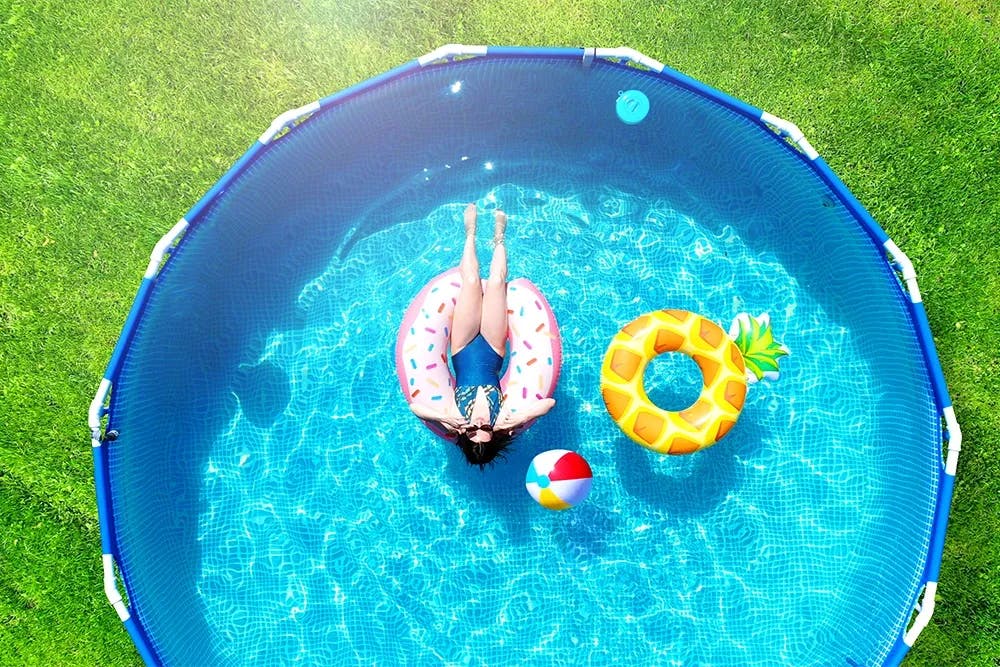
 Home
HomeHow to Winterize an Above Ground Pool
The coming of winter can be exciting for those who love snow, outdoor recreation, and the holidays.
But as fun as the change from warmer months into colder months can be, there’s still some maintenance around the house that can take place to make sure no damage takes place over the winter when temperatures drop.
This way, once spring comes, you don’t have to repair or replace certain items that may have broken due to freezing damage.
One of the items that benefits from preventative action is your above ground pool. Taking steps to make sure it’s fully winterized goes a long way in keeping all sorts of future problems from happening, including damage that can affect a pool’s overall structural integrity. The more effort you put into winterizing each year, the longer you can enjoy it without expensive fixes. Plus, having fewer fixes to take care of means you can get back sooner to enjoying your pool.
Steps to Winterize an Above Ground Pool
There are different schools of thought in what steps to take, and some depends on the climate, such as how cold it can get, or what things can be trapped in the pool if or when it freezes. Some include:
- Look at the weather. Winterizing too late means some frost may creep in. Winterizing too early means some bacteria and algae may creep in. Many pool experts suggest waiting until the temperatures are consistently under 60-65 F.
- Turn off any equipment. This includes skimmers, pumps or any electronics or machinery.
- Clean your pool thoroughly. Remove any debris that may have come in over the season. This can include leaves, bugs, algae, or any other organic matter and contaminants you don’t want around from year to year. You can use your skimmer net or vacuum.
- Lower the water level. Removing a few inches from the top can help reduce frost damage and make it easier to cover. It can absorb some loss and prevent water from getting inside the skimmer where it could freeze later.
- Place proper chemicals and balance the water chemistry. This means using the right balance of various materials to help the correct in the off-season to keep the water from freezing or becoming contaminated. How much you need depends on its status when you shut things down. There should be an ideal range of 7.4 to 7.6 ppm for pH; 80-120 ppm for alkalinity; 200-400 ppm for calcium hardness and 2-4 ppm for chlorine.
- Don’t forget the accessories. Cleaning out the pool itself isn’t the end of what you need to do for a proper winterization. It’s important to wipe down and properly inspect items like pumps, heaters and filters. Any pipes should be emptied of water and perhaps insulated if a rough winter is expected – water that freezes in a small space has the possibility of expanding and splitting. If a mild winter is expected, securely plugging the pipes may work too since this can keep other water from entering.
- Once everything is cleaned and balanced, look for a way to cover the pool for the season. This keeps more contaminants from falling in and let it freeze evenly. Various pool product dealers and manufacturers may suggest various covers. Your pump also could be covered to keep moisture from getting into delicate mechanical parts. You also can order a leaf net which catches leaves that fall.
Do I need to Shock My Pool Before Closing?
Many pool experts suggest this method as an effective way to quickly get rid of potential contaminants, including some you may not be able to detect when you’re doing your post-season cleaning.
The term shock doesn’t mean a literal electronic pulse, but a strong burst of dilated granular chlorine, which is added after the pool chemicals are added and balanced.
A good rule of thumb is one pound of granular chlorine per 10,000 gallons of pool water. This results in super clean water. If the pool water still looks un-clear, such as a green tinge, add another batch. It also helps to scrub the interior walls and pool floor to make sure some of the crystals work their way in.
Do I need to Take All Water Out of An Above Ground Pool for Winter?
This isn’t recommended for a variety of reasons. First, an empty pool can be more likely to be damaged by elements than a full one that’s fully maintained and winterized. Frost can set into the empty pool. Beyond that, draining the pool can result in a lot of water in your community’s ground and ground water. It isn’t pure water either but treated water heavy in chlorine. This could be deadly to fish and other beneficial microbes.
Plus, if you drain the pool in or around the fall, you’ll have to refill it, which your water bill won’t care for, as well as having to create the proper balance of chemicals from scratch to make sure everything is balanced again.
What happens in you leave leaves in pool over winter?
Though this seems easy to overlook, it should be taken care of quickly. Over time, leaves can break down and impact the pH level of the pool, which you’ve carefully taken care of. They also can affect chemicals and potentially lead to a breakdown in algae products.
We're Your Storage Solution!
Storage Rentals of America is your convenient self-storage solution. So come into our office or give our storage experts a call at 1-800-457-5678. Our call center is available 7 days a week and can help determine which storage unit size best fits your storage needs.



